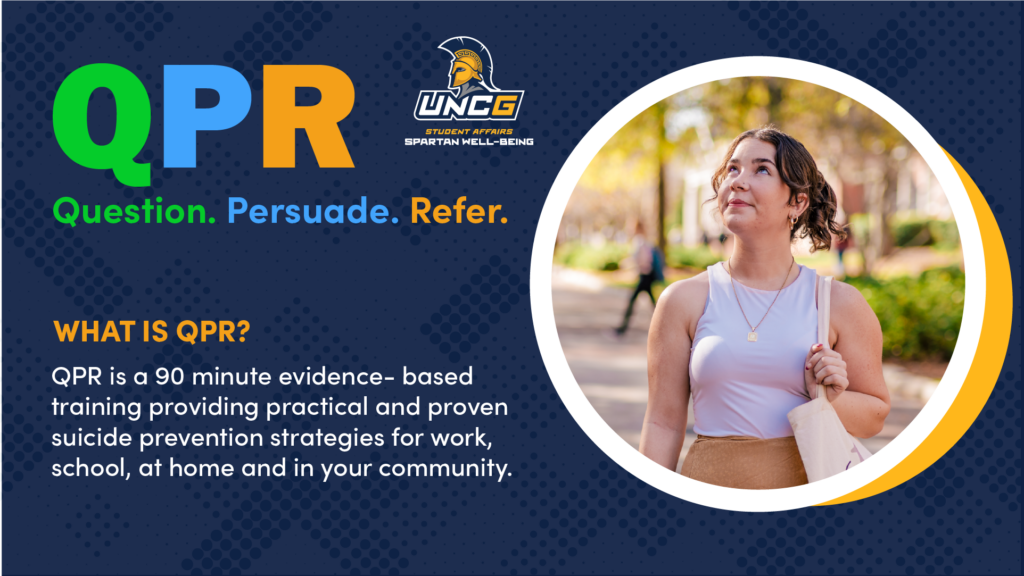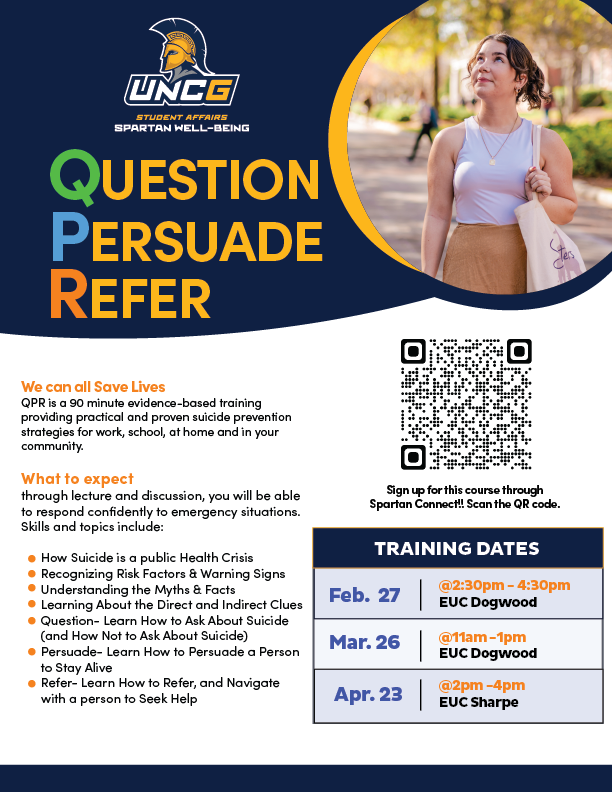Question. Persuade. Refer

what to expect
Through lecture and discussion, you will be able to respond confidently to emergency situations. Skills and topics include:
- How Suicide is a Public Health Crisis
- Recognizing Risk Factors & Warning Signs
- Understanding the Myths & Facts
- Learning about the Direct and Indirect Clues
- Question-Learn How To Ask About Suicide (and How Not To Ask About Suicide)
- Persuade-learn How to Persuade a Person to Stay Alive
- Refer- Learn How to Refer and Navigate with a person to seek help
WHY SHOULD I COMPLETE QPR?
Each year, suicide is the 2nd leading cause of death among 18-24 year olds. While there may be no single cause for suicide, there are risk factors that may increase the likelihood of an attempt such as untreated depression and anxiety.
UNCG specific statistics show an alarming increase in depression, anxiety, and stress. A 2020 report is not yet available but an increase can be suspected. (See right)
QPR will equip individuals to identify warning signs, how to intervene, and where to refer someone who is in crisis.
WHO CAN COMPLETE QPR TRAINING?
Designed for anyone, the fundamentals of QPR are easily learned and completed by Students, Faculty, and Staff.
TESTIMONIALS
The QPR training approached a sensitive topic with an organic touch that allowed me to become even more comfortable applying what I learned. I recommend that people from all walks of life take this training as we are all on this journey of life together. – Sidney, staff
I thought it was very well done, and it’s made for all walks of life. Learning the myths was important to me. For example, there is a myth that talking about suicide may push someone closer to suicide. The opposite is true, it’s good to talk about it. – Steve, faculty
QPR was super informative and easy to learn from. I was unsure on how suicide ideation looks like for different people before taking it, but now I can confidently identify the warning signs of someone who is experiencing suicide ideation. I even learned new resources and hotlines to use whenever I meet someone who appears like they might need help. Overall, I think it is was very comprehensive and raises important things to consider when helping someone who is experiencing suicide ideation. – Jackie, student
Available through a behavioral health grant from the UNC-System for the 2020-2021 school year.
RESOURCES
Campus Resources
- UNCG Counseling & Psychological Services-336-334-5874, 107 Gray Dr., 2nd floor
- In Crisis: https://shs.uncg.edu/counseling-psychological-services/in-crisis/
- Spartan Recovery: https://shs.uncg.edu/srp for students who want to begin, maintain, or return to a life of recovery from addiction to alcohol or other drugs
- UNCG Campus Violence Response Center -336-334-9839, 107 Gray Dr., Ground floor
- For students who have been victimized by violence. Services include crisis response, advocacy, counseling, support groups, and coordination with on-campus services.
- UNCG Student Health Services – 336-334-5340, 107 Gray Dr.
- UNCG Campus Police -336-334-4444, 1200 W. Gate City Blvd.
- UNCG Employee Assistance Program-ComPsych Guidance Resources -1-800-630-4847
- UNCG Dean of Students Office – (336) 334-5514, 210 EUC,
- Helps students troubleshoot concerns like housing or food insecurity, etc
Community Resources
All resources are available 24/7
- Behavioral Health Urgent Care Center – 336-890-2700, 931 Third St.
- Cone Health Wesley Long Hospital – 336-832-0212, 2400 W. Friendly Ave.
- Cone Health Behavioral Health Hospital – 336-832-9700, 700 Walter Reed Dr.
- Moses H. Cone Memorial Hospital – 336-832-7000, 1121 N. Church St.
- Monarch Crisis at The Bellemeade Center – 336-676-6840, 201 N. Eugene St.
- Therapeutic Alternatives Mobile Crisis Unit – 1-877-626-1772
National Resources
- National Suicide Prevention Lifeline: 1-800-273-TALK (8255)
- https://988lifeline.org/ (chat box online)
- LGBTQ Helpline: 1-866-488-7386
- https://www.thetrevorproject.org/ (chat box online)
- Veterans’ Suicide Prevention Lifeline: 1-800-273-8255, then press 1
- https://www.veteranscrisisline.net/ (chat box online, text messages)
- Suicide Crisis Line: 1-800-SUICIDE
- Crisis Text Line: Text CONNECT to 741741
- Suicide Prevention Resource Center (SPRC)
If you or someone you know are in distress, call the National Suicide Prevention Lifeline 800-273-8255
ReGISTER FOR a training
To request a training for a group of 10
UNCG MENTAL HEALTH STATISTICS*
- Reported that anxiety had affected their academic performance (24.2% in 2014 vs. 27.7% in 2018)
- Overall level of stress experienced over the past 12 months as “above average” or “tremendous” (55.5% in 2014 vs. 59.9% in 2018)
- Reported that stress had affected their academic performance (30.7% in 2014 vs. 36.2% in 2018)
- Felt so depressed it was difficult to function (35.9% in 2014 vs. 50.7% in 2018)
- Felt overwhelming anxiety (60.7% in 2014 vs. 67.5% in 2018)
- Reported that depression had affected their academic performance (15% in 2014 vs. 20% in 2018)
*American College Health Association. (2018). American College Health Association-National College Health Assessment-UNCG Administration . Silver Spring, MD: American College Health Association.
DOWNLOAD & PRINT THE FLYER!
Post this flyer and encourage your students & colleagues to complete this 30-45 minute training! Be Someone’s Hero!
